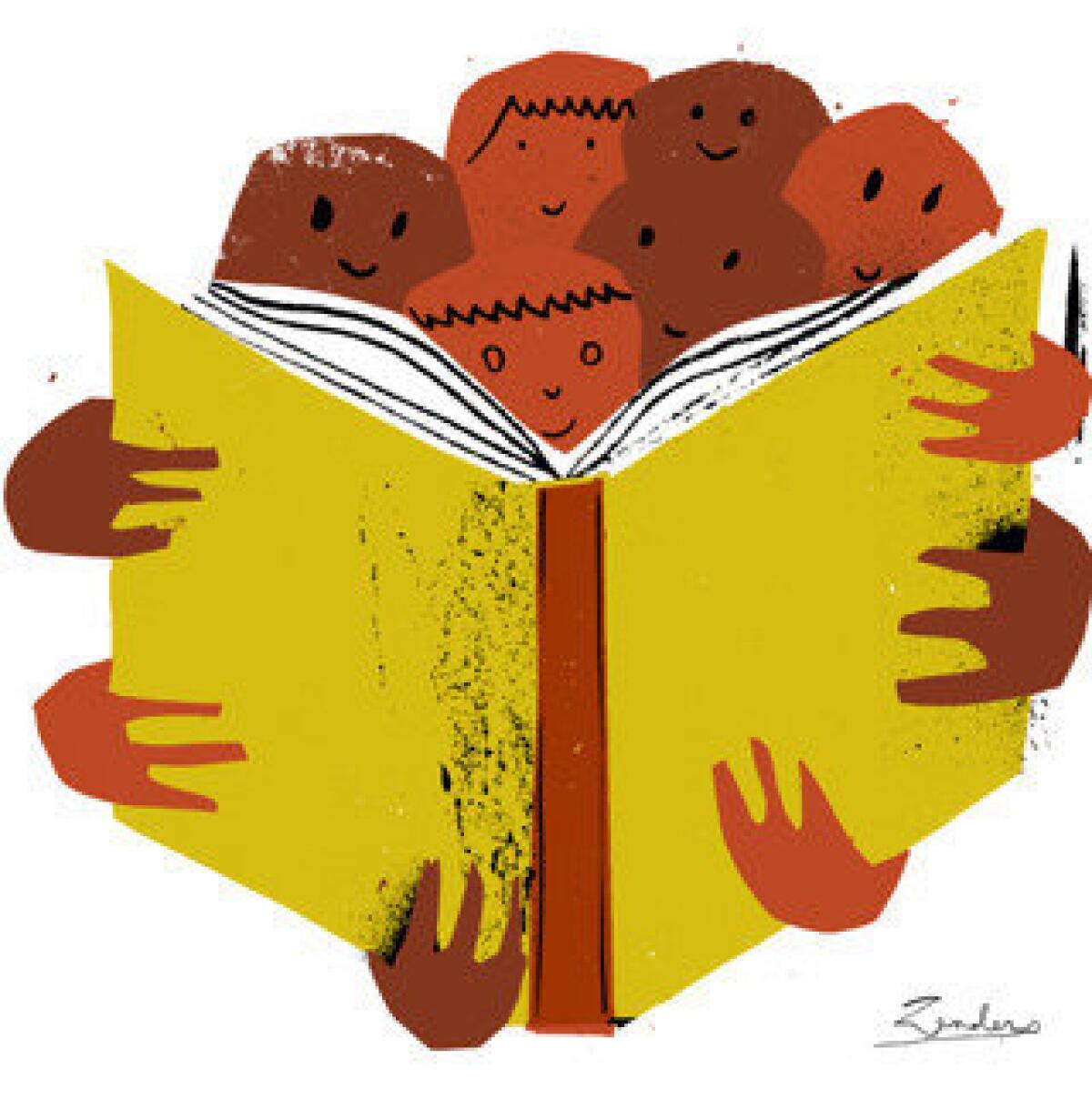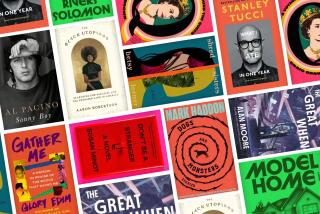Reading, no batteries required

- Share via
Tenderly, the lover caressed his beloved. So pale, so smooth. He tilted his head forward, the better to inhale that scent — rich and enticing. Fingertip to spine, feeling every contour, he pressed his face closer — and turned a page.
I don’t know what you were thinking about, but I was talking about a book. A real book.
The Kindle and its ilk are just gizmos with pixilated screens. Hit the off button and its borrowed character vanishes. A genuine book has a soul of its own. It is tactile, beautiful, accessible. Not only do its contents tell us stories, it in itself is a story. That rare copy of Sir Isaac Newton’s “Principia” — did his own august eyes behold it? And that first edition of “Pride and Prejudice” — whose ladylike hands held it, turned its pages by candlelight? The old copy of “The Cat in the Hat” is beloved not only for the tale it tells but for the crayoned personalization added by each generation of a family’s children.
Do you mock books as old school? Wise up. Remember the 8-track tape that was supposed to be the dernier cri? Vanished into the recycling bin of history. The DVD gets supplanted byBlu-ray, which will soon be made obsolete by something else.
Yet paper and parchment are still around, still legible, still “working” multiple centuries later. You don’t need to wait for the page to load. All the technology it needs to work is the human eye. No password, no batteries required. A book doesn’t stop working when it’s dropped. You can read it on the tarmac even after the command to turn off all electronics. It isn’t ruined when it gets wet (the salvage operation after the 1986 Central Library fire proved that, and how many books have I dropped in the bathwater and dried them out?). The only grave threat to a book is a flame, accidental or deliberate. Books are immensely, symbolically, mystically powerful; the fact that fearful humans ritually burn them, the way they once burned witches, attests to it. No book, someone said, has the power of a burned book.
I owe to books so much of what is rich and delicious in my life. Landlocked as I was growing up in a small town, the book was a door. To open a book was to open a door to — anyplace. It was a time machine crafted of paper, a 300-page passport into Dickens’ Victorian London, where children were swept into pickpocket gangs or beaten and half-starved in factories; into the silent desert tombs of Howard Carter’s expedition to find Tutankhamen; into the thick of the Civil War at Antietam with Clara Barton; or off on a comet with Jules Verne’s imagination as my guide.
I journeyed to places, imaginary and real, that I could never have seen or known — except for this pound or so of paper and ink in my hand. I had never been aboard a yacht, but I knew it down to the capstan. I had never climbed Mt. Everest, but George Leigh Mallory took me there. These were my friends and my teachers, as real as any kids in the playground, as any teachers at the chalkboard.
Our town librarian let me cruise the grown-up shelves, “overserved” me by letting me borrow more than the usual weekly allotment, and always had suggestions ready when I came back for more.
We had no bookstore and, to paraphrase Scout in “To Kill a Mockingbird,” nothing much in the way of money to spend, anyway. My parents had acquired for me a set of brilliantly illustrated children’s encyclopedias by driving 11 miles out of town to the big supermarket. There, for every $25 you spent on groceries, a dollar bought you another volume of the encyclopedia. A couple of times a year, a book fair came to town and set up shop in the school gym, and my parents managed to let me buy two books. I think I’ve taken less time to choose a car than I took to walk slowly through those rows of tables to make my pick.
One of those book-fair books quite literally changed my life — a young people’s biography of Nellie Bly. She was the 19th century woman who, despite being banned from voting, managed to become a reporter, exposing political corruption and writing dispatches from around the world. That, I decided, was exactly what I wanted to be. (The illustration of her doing all this in a fetching hat didn’t dent the appeal either.) Stashed away somewhere, I still have that book.
We are so accustomed to books that we have stopped thinking of how astonishing they are. Stop and think of that. Here is what a book can do. Using symbols, patterns of lines and curves of ink arranged on a rectangle of processed wood pulp, people you have never known, people who have been dead for half a millennium, can talk to you across the centuries. Their words, their thoughts, make them live again. From their graves, they can make us laugh, make us angry, make us weep, make us understand them.
I was just reading a book called “Immortality: the Quest to Live Forever and How It Drives Civilization.” We can ease up on that right now. We already have a kind of immortality. It’s called a book.
More to Read
Sign up for our Book Club newsletter
Get the latest news, events and more from the Los Angeles Times Book Club, and help us get L.A. reading and talking.
You may occasionally receive promotional content from the Los Angeles Times.







